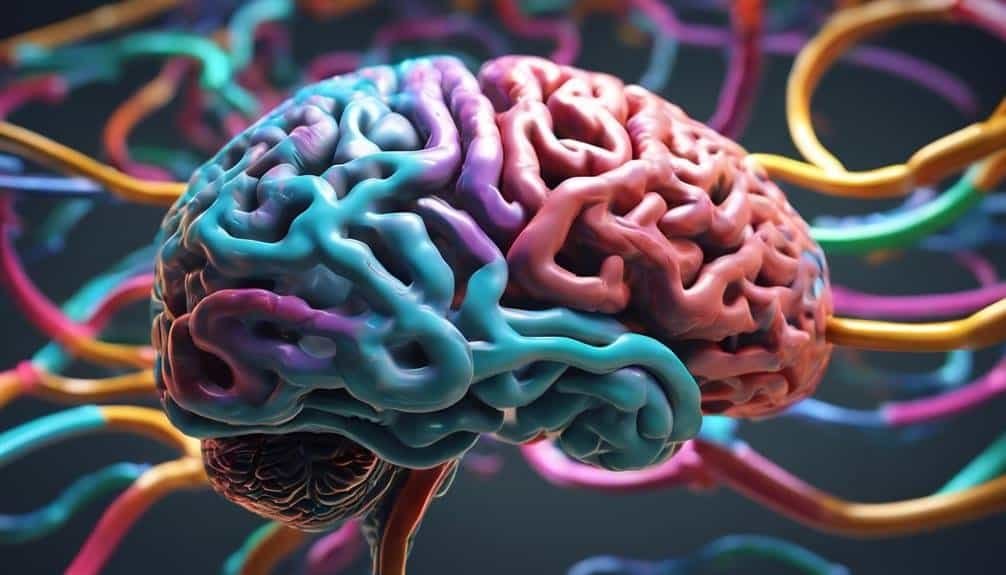Your ADHD Brain: Harnessing Focus, Creativity, and Hyperfocus for Success
In your ADHD brain, neural pathways and neurotransmitters impact attention and impulse control. Atypical patterns affect executive functions, revealed by neuroimaging. Reduced prefrontal cortex activity contributes to focus and impulse challenges. To optimize cognitive processes, break tasks into smaller parts and use tools like timers. Structured schedules and techniques like the Pomodoro Method enhance productivity. ADHD brains boast unique pathways and divergent thinking for creativity. Leveraging hyperfocus periods and tools like mind mapping aid idea generation. Embrace intense focus for cognitive productivity but incorporate balance strategies. Prioritize time management, SMART goals, and task breakdowns for success. Unleash your potential for success through harnessing focus, creativity, and hyperfocus.
Key Takeaways
- Break tasks into manageable segments to prevent overwhelm and enhance focus.
- Utilize tools like timers and structured schedules for effective time management.
- Leverage ADHD brain's unique neural pathways for enhanced creativity.
- Employ mindfulness techniques to balance intense focus and productivity.
- Set SMART goals, prioritize tasks, and track progress for success and fulfillment.
Understanding ADHD Brain Function
To understand the distinctive brain function of ADHD, one must explore the intricate neural pathways and neurotransmitter activity that underlie this neurodevelopmental disorder. In individuals with ADHD, cognitive processes such as attention, impulse control, and executive functions are impacted by atypical neurological patterns. Neuroimaging studies have revealed differences in brain structure and connectivity, particularly in regions responsible for regulating attention and controlling impulses.
One key neurological pattern observed in ADHD is reduced activity in the prefrontal cortex, a region essential for executive functions like planning, organizing, and decision-making. This decreased activation can lead to difficulties in maintaining focus, inhibiting impulsive behaviors, and managing time effectively. Additionally, abnormalities in the dopamine neurotransmitter system play a significant role in ADHD, affecting motivation, reward processing, and attention regulation.
Understanding these underlying neurological patterns is essential for developing targeted interventions that can help individuals with ADHD improve their cognitive processes and daily functioning. By addressing these specific brain mechanisms, tailored strategies can be implemented to harness the unique strengths associated with ADHD while mitigating its challenges.
Boosting Focus and Productivity
Enhancing focus and productivity involves implementing targeted strategies to optimize cognitive processes in individuals with ADHD. Improving concentration is a key aspect of boosting productivity. One effective strategy is to break tasks into smaller, more manageable parts. This approach helps prevent feeling overwhelmed and allows for better focus on each component. Additionally, utilizing tools like timers or apps can aid in time management, assisting in allocating specific timeframes for tasks.
Time management plays a critical role in enhancing productivity. Creating structured schedules and adhering to them can help individuals with ADHD stay on track. Prioritizing tasks based on importance and deadlines is essential for effective time management. Implementing strategies such as the Pomodoro Technique, which involves working for focused intervals followed by short breaks, can enhance productivity by maintaining concentration levels.
Unleashing Creative Potential
Harness your ADHD brain's unique neural pathways and cognitive flexibility to spark a surge of creative potential. Individuals with ADHD often exhibit enhanced divergent thinking, allowing for unconventional idea generation and unique problem-solving approaches. To ignite your creative breakthroughs, consider implementing specific innovation techniques tailored to your cognitive style.
One effective method is brainstorming, where the rapid generation of ideas can capitalize on your brain's tendency to make unique associations. Embrace your ability to think outside the box and explore diverse perspectives to fuel your creativity. Additionally, leveraging hyperfocus periods can be instrumental in delving deep into a creative task, allowing for immersive exploration and ideation. By recognizing when hyperfocus naturally occurs and channeling it towards creative endeavors, you can maximize your innovative potential.
Experiment with various creativity tools and techniques, such as mind mapping, free writing, or creative visualization, to stimulate your imagination and foster original ideas. Embrace the dynamic nature of your ADHD brain to propel your creative endeavors forward and reveal a world of innovative possibilities.
Harnessing the Power of Hyperfocus
Embracing and directing your innate capability for intense focus can greatly amplify your cognitive productivity and enable deeper engagement with complex tasks. Hyperfocus, a common trait in individuals with ADHD, can be harnessed for enhanced performance through effective time management strategies and mindfulness techniques.
Effective time management is essential in maximizing the benefits of hyperfocus. By breaking down tasks into smaller, more manageable segments and setting specific time limits for each, you can prevent hyperfocus from leading to tunnel vision and guarantee a balanced approach to your work. Additionally, using tools like timers or task lists can help you stay on track and make the most of your focused periods.
Mindfulness techniques can also play a significant role in harnessing hyperfocus. Practicing mindfulness can help you become more aware of your attention levels and prevent yourself from getting lost in hyperfocus for extended periods. Techniques such as deep breathing exercises or brief meditation sessions can aid in maintaining a healthy balance between intense focus and cognitive flexibility, ultimately boosting your overall productivity and task completion efficiency.
Strategies for Success and Fulfillment
To optimize your cognitive performance and achieve both success and fulfillment, implementing tailored strategies that align with your ADHD brain's unique strengths is essential. Two key components that play a vital role in this optimization are effective time management and goal setting. Time management skills are critical for individuals with ADHD to enhance productivity and reduce feelings of being overwhelmed. Breaking down tasks into smaller, manageable steps, utilizing tools like calendars and reminders, and setting specific time blocks for different activities can greatly improve your ability to stay organized and focused.
Similarly, goal setting provides a clear direction for your efforts, helping you prioritize tasks and track progress. Establishing SMART goals (Specific, Measurable, Achievable, Relevant, Time-bound) can assist in maintaining motivation and increasing accountability. By setting realistic objectives and breaking them down into actionable steps, you can enhance your likelihood of success and experience a sense of fulfillment as you accomplish each milestone.
| Time Management | Goal Setting |
|---|---|
| Use calendars | Set SMART goals |
| Break tasks down | Prioritize tasks |
| Set time blocks | Track progress |
Conclusion
To sum up, by understanding and harnessing the unique abilities of your ADHD brain, you can tap into a wealth of potential for success and fulfillment.
Take for instance, Sarah, a graphic designer with ADHD who struggled to focus on her work.
Through implementing strategies such as setting clear goals, utilizing hyperfocus, and embracing her creativity, Sarah was able to produce some of her best work yet and achieve her career aspirations.
Embrace your ADHD brain and watch as you reach new heights of achievement.








